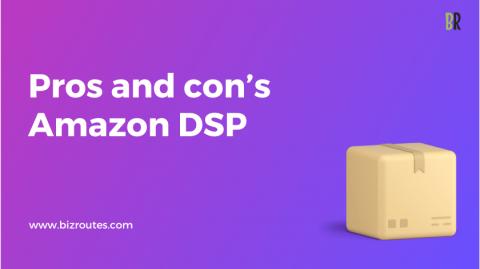
How do amazon routes work?
Seeing all those Amazon trucks probably got you wondering, where do you sign up? Whether it's looking for a job or just buying an established Amazon route for sale. In this guide, we will break down the fundamentals of how Amazon routes work and the pros and cons of actually owning one. Amazon created this fleet operation model for a genius reason but primarily to gain better control over its delivery side. It helps reduce the reliance on third-party companies like UPS and FedEx. And most importantly, Jeff Bezos' customer satisfaction obsession to assure delivery promises, such as same-day or next-day delivery for the company's Amazon Prime members. This operation helps lower its delivery cost, improves delivery speed, and, most importantly, increases operational flexibility - They are even working on drone delivery, but we can talk about that another time!
How does the Amazon DSP model work?
The program is made to benefit both Amazon and entrepreneurs looking to own and operate their own delivery business within Amazon’s extensive logistics network.
Individuals that are interested have two options: the first one is to apply directly to the program. This will require an investment that would cover vehicles, insurance, and startup costs. The good part is Amazon provides training and ongoing support, including many advanced technology and analytics tools, to make you get the most out of your investment as well as having the ability to manage your business smoothly.
The second option is to just buy an established Amazon route for sale that will come with all the above but already be in operations. You will get the vehicles, employees, and managers in place, which many choose to go with. This all comes down to your budget.
Where can I buy an established Amazon route for sale?
Finding an Amazon route business for sale can be complexed, Unlike buying a fedex route. I mean, you will find, but they may not be in the state you are in, but you can search our database to start and remember to register so we can send you updates on new Amazon or similar listings for sale in your state and area.
Overall, this transaction allows you as the new owner to step into an established logistics business, complete with the whole nine like vehicles, routes, and an operational team, essentially skipping the initial startup phase.
The process involves a private transaction between the buyer and the current owner, where the buyer takes over the responsibilities and operations of the delivery service, leveraging Amazon's infrastructure to continue delivering packages efficiently and growing the business within Amazon's expansive e-commerce ecosystem.
Pros and cons of the Amazon DSP program
Pros
.png) Low start-up cost
Low start-up cost
.png) No logistic experience needed
No logistic experience needed
.png) Offers training and support with Amazon's tech for better success.
Offers training and support with Amazon's tech for better success.
.png) Amazon's increasing deliveries mean more chances to grow.
Amazon's increasing deliveries mean more chances to grow.
.png) Benefits from Amazon's advanced delivery and logistics tech.
Benefits from Amazon's advanced delivery and logistics tech.
Cons
.png) Parking tickets
Parking tickets
.png) Owners can only operate from a single station (Hard to expand to other cities)
Owners can only operate from a single station (Hard to expand to other cities)
.png) Having to keep finding employees
Having to keep finding employees
.png) 16-week training program
16-week training program
.png) Many people are joining the DSP program, so it doesn't guarantee you will be approved
Many people are joining the DSP program, so it doesn't guarantee you will be approved
The bottom line
Thinking about the good and bad points, dealing with Amazon's DSP program has both chances and tough parts. Because of starting costs, day-to-day problems, and strict rules, some business people choose to buy an already working Amazon route. This way, they get into a business that already works, has a team, is profitable, and knows the market well. Buying a route can help skip the first hard steps, letting them quickly start growing and making things better in Amazon's big delivery world. What would you consider, buying or starting an Amazon route?
.png) Qassem yafai
Qassem yafai
Disclaimer: This article is not endorsed or sponsored by amazon. It is provided for informational purposes only, and the research conducted was done independently. It is important for readers to conduct their own research before purchasing a amazon route for sale or any other business. This article does not constitute legal advice or an attempt to solicit readers into buying a business. We do not earn any commissions from listings, and we do not verify the availability or accuracy of listings for sale.




